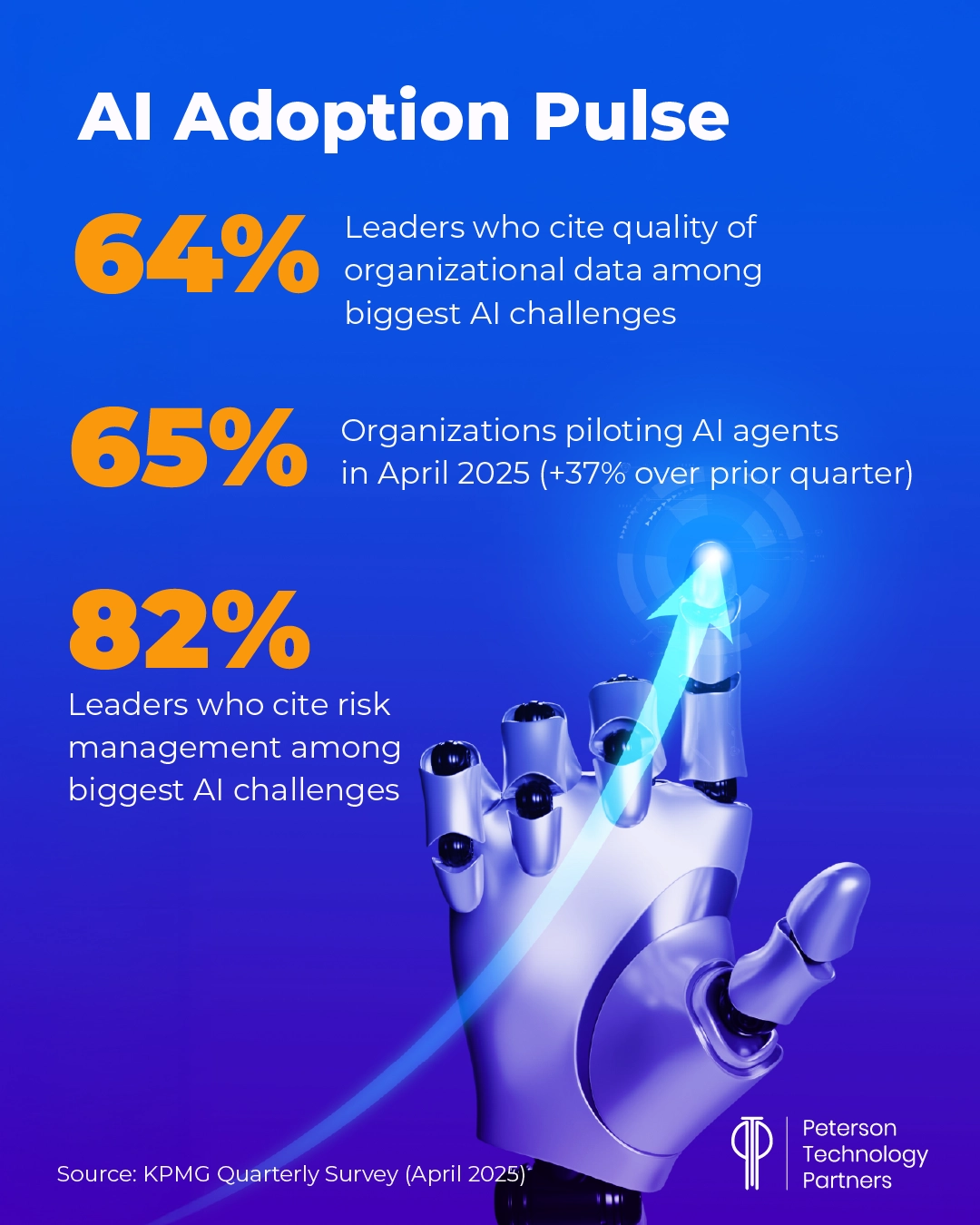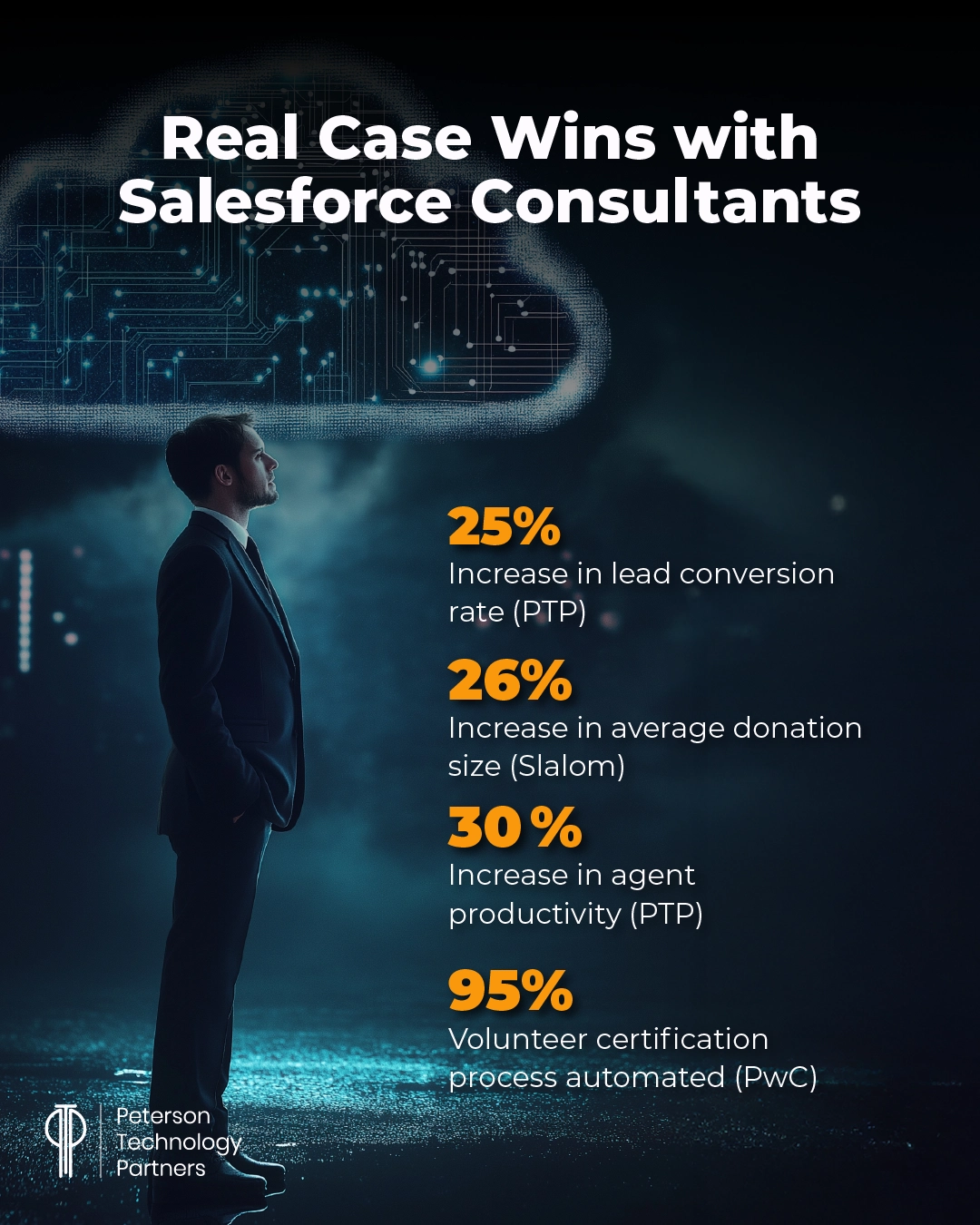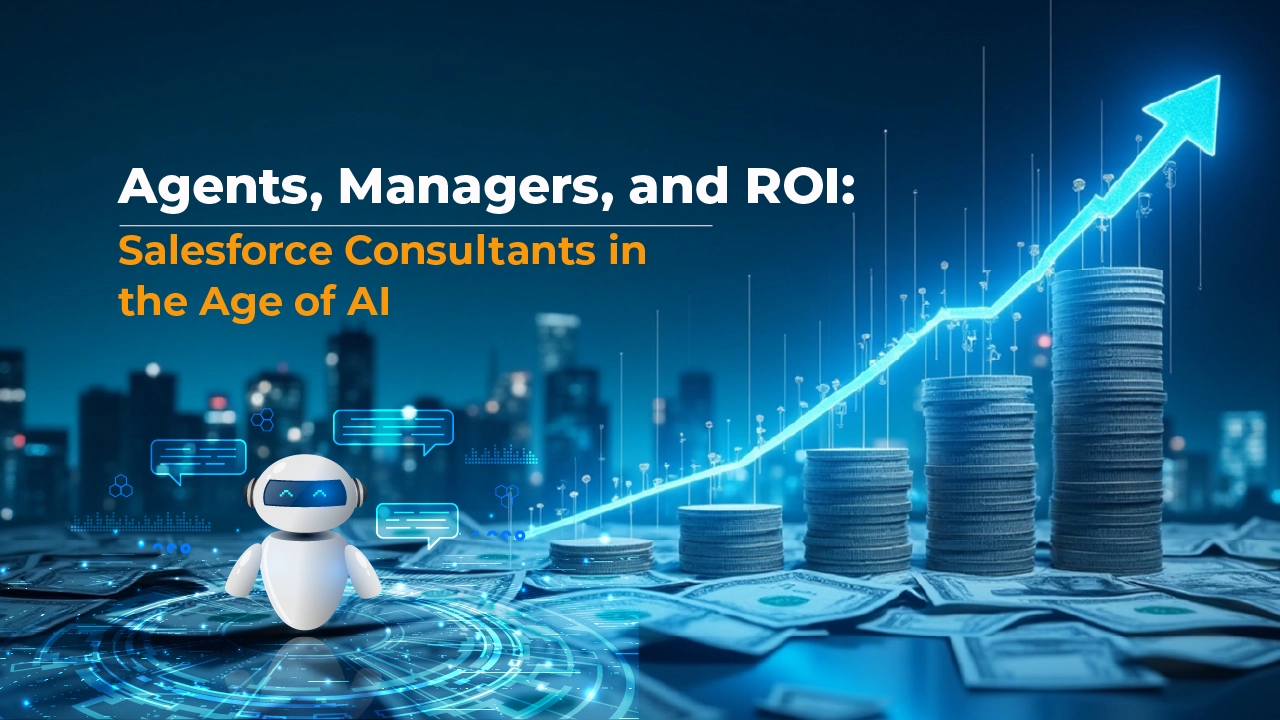Traditionally Salesforce consultants have been sought out by businesses for configuration and one-offs. Consultants helped you hit the ground running and personalized the CRM and its solutions as you needed.
But today, this role is shifting. With Salesforce’s sizeable investment in AI now bearing real fruit, companies can take real advantage of intelligent automation, more sophisticated real-time data, and AI agents with the potential to eliminate the manual repetition in workflows.
To maximize (and measure) ROI from AI in Salesforce, consultants today can assist with bringing needed governance, improving data readiness, helping redesign processes for AI, as well as managing, and securing, the change.
This shift mirrors in some ways the shift in CRM overall, where systems are growing out from data repositories and management systems with a high degree of manual upkeep to true communication and relationship optimizers.
Today’s PTP Report looks at this shift, profiling example case studies and covering the kind of benefits that consultants should bring to Salesforce implementation in this changing world of AI.
The Shifting Needs in Salesforce Consulting Services
2025 was supposed to be the year of the AI agent, but it may be more the year AI agents first kick off.
Agents promise the ability to work across systems like their own digital workforce, and Salesforce enables this collaborative involvement in sales, marketing, and service.
But readiness for the step is critical, and that begins with data. Today’s Salesforce consultants can help you with cross-system access that’s secure, so that agents are able to take advantage of real-time, governed data that’s accurate as well as safe.
This shift means moving from simple execution or building out features to hands-on agent deployment with the right permissions and guardrails in place.
Agents aren’t applying chatbots to existing processes. They can take action independently and need identity and permissions, along with continuous monitoring. Effective consultants should assist in establishing this consistent and effective auditing.

And when it comes to measuring value, it can be deceptively difficult to get an accurate assessment of true CRM ROI with AI (see below).
To be worth its weight, AI should aid in everyday work, and the biggest benefit is often first seen in bottom-up efficiencies.
For consultants, AI is already replacing those who don’t evolve to provide these benefits for companies.
Salesforce itself reduced roles for customer support in September, with CEO Marc Benioff saying the company simply no longer needed that scale of support with AI.
“Because of the benefits and efficiencies of Agentforce, we’ve seen the number of support cases we handle decline and we no longer need to actively backfill support engineer roles,” the company said in a statement.
This with the claim that AI is already doing up to 50% of the work at Salesforce.
Examples of Salesforce Implementation in Action
Here are some well documented examples of customer stories that showcase the value in effective Salesforce consulting today.
UCLA Anderson School of Management with Secure, Personalized AI
The UCLA Anderson School of Management used consultants with Salesforce’s Marketing Cloud to tap specifically into AI’s unique capacity for personalization.
The challenge was to put AI to a real-world use case while also proving its value clearly and unambiguously.
Multiple teams collaborated on the solution (including AWS), and Salesforce provided the optimization.
With the need to get the AI access to alumni data, security was critical, so the team utilized their existing AWS and Marketing Cloud instances to ensure no data ever left the client’s own environment.
The results from the test speak for themselves: a 66% increase in e-mail click through, 86% increase in conversion to donation, and a 132% improvement in the money raised.

48in48 and Data Readiness
PwC consultants helped 48in48, a nonprofit that provides free web design, development, and marketing for other nonprofits, centralize their own data with Salesforce.
With their resources fragmented among nonprofits, volunteers, and donors, reliable reporting and analytics were exceedingly difficult.
With the assistance of consultants, they were able to achieve Salesforce data readiness, getting new, transparent analytics for donors and the board. They reduced human data touches and uncovered a wealth of insights they’d been previously lacking.
This centralized data gives real-time visibility on actionable areas like attendance and fundraising progress and frees their staff to focus on more important tasks.
Consultants here also provided the necessary AI training, tools, and resources to make the most of their Salesforce move.
And with this cloud foundation well in place, 48in48 can continue to evolve in their daily operations at their level.
Earning Their Keep Today: Salesforce Consultants and AI
As in the examples above (and at PTP; see below), consultants go beyond just configuration. Partnership brings AI experience that aids in design. This includes understanding what Salesforce agents can and can’t do, helping maintain voice, and reducing errors while maximizing benefits.
Effective consultants should be able to review performance and assist with fine-tuning. By understanding governance and risk tolerance, they can help you determine what permissions agents will need and where they should not be allowed to act. They can also ensure compliance and consent are obtained where necessary.
For all AI integrations, efficient and effective human-in-the-loop workflows are essential, and the faster these run, the more effective (and reasonable) they can be. Effective Salesforce governance should include cross-functional collaboration and honest alignment with your business objectives.
This includes integrating your solutions with tools, as needed, be it Agentforce, Einstein Copilot, Marketing Cloud, Slack, Tableau, MuleSoft, or external tools like data repositories and engineering and DevOps resources.
Data readiness is critical, with access and mappings that agents can actually utilize. Salesforce’s $8 billion acquisition of Informatica in May points to the company’s continued focus on data management, and to take advantage of this growth, companies need to have their own data foundation well established.
Getting the most from AI-fueled Salesforce includes a willingness for process redesign, something few pilots take into account. Agents can remove steps from your workflow, but they also need monitoring. This redesign requires experience and the right insights.
Build, Buy, and Measuring Salesforce ROI
Numerous studies have come out in the last year showing the fallibility of enterprise AI pilots. This includes the much-discussed MIT report from NANDA that showed 95% of enterprise AI pilots they studied failed to get meaningful ROI. This despite spending $30–40 billion.
Their study also highlights how few companies have really integrated AI into their workflows at scale and points to the success of external partnerships over in-house builds (with around twice the rate of success).
Of course, studies like this can be very limited in selection and thus self-serving, and it can be difficult for companies to know for sure what their real odds are for success and failure.
In the same way, for CRM installations that are already in place, you may have a clear sense that Salesforce is helping you boost sales but not know exactly by how much.
Nor how much of it is related to AI and is aided (or not) by your choice of consultants.
This is another area consultants must provide reliable, quality assistance, by constructing an ROI framework that gives you real, A/B comparative measurements (like the UCLA study example above).
This should include customer satisfaction (retention and lifetime value), employee satisfaction (turnover), and competitive wins (revenue). It should establish clear pre-implementation baselines with full cost accounting, cross-functional data integration, and a time-to-gain that illustrates both the scale of the benefits you’re receiving and the expected speed to ROI.
The methodology should be sufficiently transparent, too, to limit the possibility of excessive claims.
PTP’s Salesforce Consultants
Of course, we’re writing this article because at PTP, we have experience helping companies maximize AI-powered Salesforce solutions.
We also have a wealth of AI experience outright. As an AI-first global consulting and recruiting firm, we integrate AI throughout our processes to bring greater efficiency and effectiveness.
The bottom line: we’ve seen the good, the bad, and the ugly with GenAI and know how to help you avoid the worst and get the most for your spend.
Our own case studies are well documented on our website, as is our proven track record.
If you’re in need of getting the most from AI and own CRM investment, consider us to get consulting for the age of AI done right.
References
Salesforce CEO confirms 4,000 layoffs ‘because I need less heads’ with AI, CNBC
KPMG AI Quarterly Pulse Survey, KPMG
What’s holding enterprises back from AI agent success?, CIO Dive
ROI Measurement in Salesforce: The Consulting Framework That Proves Value, Tech Bullion
GenAI personalization for alumni fundraising, Slalom
Salesforce Nonprofit Cloud helps 48in48 drive its mission to empower nonprofits, PwC
Salesforce acquires Informatica for $8 billion, TechCrunch
FAQs
With Agentforce increasingly building in features for governance, why is there still a need for Salesforce consultants?
The role of consultants has very much changed from a primary focus on configuration and settings. Today’s consultants should be able to help companies prepare their data to maximize AI, re-design workflows not only to use agents but also ensure effective (and efficient) human-in-the-loop and provide ROI measurements that leaders can trust.
Can’t internal IT teams handle this instead of using outside partnerships?
It’s certainly possible, depending on the size of the organization and the people in place. But the fact is that most organizations lack experience with AI agents and the needed cross-disciplinary skills, from crafting effective policies to data engineering to change management.
How do I choose the right Salesforce consulting partner for my company?
In other words, why choose PTP?
With nearly 30 years of experience in consulting and technical recruiting, we have a proven track record of helping companies get real value and effective returns on their tech investments. We’re also a global, AI-first organization that prides itself on ongoing training and support, not just implement-and-forget.





